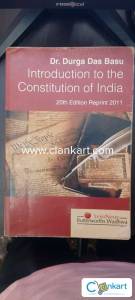Buy used Politics books online in India
Buy Second Hand Books, Used Books Online In India
Indian Constitution by Durgadas Basu for IAS
From a common man to Law student to UPSC aspirant this book is very useful in getting knowledge about our constitution, Right to education, Right to speak, Right to express etc., everything is covered in this book in a a detailed manner. This book is Written by Dr. Durga Das Basu.
Class 7th, new geting ahead in social science
Not Many People Known About Bose`S Love For Emile Schenkl, His Austrian Wife. The Volume Includes 162 Letters Written Between 1934 And 1942 An Alos 18 Letters Of His Wife That Have Survived. Illuminate The Human And Emotional Aspects Of His Life.
Taliban - The Story of the afgan warlords by Ahmed Rashid
The definitive account of the history of the Taliban and its uncertain future.This is the book that Tony Blair and Alistair Campbell consulted to gain a better impression of the unique circumstances of the Taliban. An exploration of the overwhelming complexity of Afghan politics, The Taliban: The Story behind the Afghan Warlords explains how it came in to being, how it is sustained and how Osama bin Laden has risen to such a figure of absolute power. Ahmed Rashid clarifies the often confusing racial and religious tensions that dominate this fractious land. And describes why the drug trade has exacerbated an already untenable situation. Rashid argues that Taliban is incapable of reform, and that, in the current crisis, it may implode due to defections. With the Northern Alliance an unpredictable alternative, Rashid concludes that without a multi-tribal government in which bordering states do not seek predominant influence, there will never be peace.'Read this remarkable book and the bewildering complexity of Afghan politics and the deadly over-spill of chaos, narcotics and sectarian violence into the surrounding region will become clear.' Patrick Seale, Sunday Times'Ahmed Rashid's book describes the stuff that Bond [films] are made of. Warring tribes, clashing empires, fanatics with dreams of world domination, violence and sex . If anyone understands the place Rashid does.' Jason Burke, Observer
Children's story book
Shaheen Bagh: A Graphic Recollection is a graphic account of the most famous political sit-in of recent times, which started on one side of a public thoroughfare in Delhi in December 2019 and continued till March 2020 when it was cleared by the police after the government declared a nationwide lockdown to contain the spread of COVID-19.The book tells the story of the Muslim women who started the protest that became the catalyst for a pan-India political movement against the Citizenship (Amendment) Act (CAA) and the proposed National Register of Citizens (NRC). Based on conversations and interviews with the women who were part of the protest, Ita Mehrotra's graphic narrative archives moments from a movement that spread like wildfire through the length and breadth of the country and continues to inspire voices of dissent. Through the portrayal of women’s stories in image and word, we re-enter some of the many poignant dialogues, debates and questions that were raised about citizenship, democracy and minority rights, over the course of the movement. Shaheen Bagh: A Graphic Recollection brings alive the protest that lasted 101 days and forever changed the way women's role in movements would be seen and understood.
AZAADI ARUNDHATI ROY
FROM THE BEST-SELLING AUTHOR OF MY SEDITIOUS HEART AND THE MINISTRY OF UTMOST HAPPINESS, A NEW AND PRESSING DISPATCH FROM THE HEART OF THE CROWD AND THE SOLITUDE OF A WRITER'S DESKAzadi-Urdu for Freedom-is the refrain in the iconic chant of the Kashmiri freedom struggle. And now, while Kashmir's streets have been silenced, the irony is that its people's anthem, with similar lyrics, rhythm and cadence, echoes on the streets of the country that most Kashmiris view as their coloniser. What lies between the silence of one street and the sound of the other? Is it a chasm, or could it become a bridge?In this series of penetrating essays on politics and literature, Arundhati Roy examines this question and challenges us to reflect on the meaning of freedom in a world of growing authoritarianism.Roy writes of the existential threat posed to Indian democracy by an emboldened Hindu nationalism, of the internet shutdown and information siege in Kashmir-the most densely militarized zone in the world-and India's new citizenship laws that discriminate against Muslims and marginalized communities and could create a crisis of statelessness on a scale previously unknown. The essays include mediations on language, public as well as private, and the role of fiction and alternative imaginations in these disturbing times.Azadi, she warns, hangs in the balance for us all.
The India Way
The decade from the 2008 global financial crisis to the 2020 coronavirus pandemic has seen a real transformation of the world order. The very nature of international relations and its rules are changing before our eyes.For India, this means optimal relationships with all the major powers to best advance its goals. It also requires a bolder and non-reciprocal approach to its neighbourhood. A global footprint is now in the making that leverages India’s greater capability and relevance, as well as its unique diaspora. This era of global upheaval entails greater expectations from India, putting it on the path to becoming a leading power.In The India Way, S. Jaishankar, India’s Minister of External Affairs, analyses these challenges and spells out possible policy responses. He places this thinking in the context of history and tradition, appropriate for a civilizational power that seeks to reclaim its place on the world stage.
Swaraj by Arvind Kejriwal
The year 2011 was defined by the Anna Hazare-led agitation against corruption. The fakir from ralegaon siddhi shook the bastions of power in Delhi to their foundations. Even the middle class and the elite, who normally confine themselves to drawing room discussions on politics, joined the movement and took to the streets. Arvind Kejriwal played a key role in this agitation. The main demand of the group was the implementation of the Lok Pal Bill. Many promises were made by the political class, but nothing much actually happened the bill has still not been passed by Parliament. This book shows us the way forward, what we the people and what the opinion makers and political establishment in India can do to achieve true Swaraj – Lok Pal is only one facet of this true devolution of power to the people. Kejriwal’s vision deserves consideration by anyone who wants power to vest with the people, not with netas.
The Future of Geography by Tim Marshall
Spy satellites orbiting the moon. Space metals worth more than most countries’ GDP. People on Mars within the next ten years. This isn’t science fiction. It’s astropolitics. Humans are heading up and out, and we’re taking our power struggles with us. Soon, what happens in space will shape human history as much the mountains, rivers and seas have on Earth. It’s no coincidence that Russia, China and the USA are leading the way. The next fifty years will change the face of global politics. In this gripping book, bestselling author Tim Marshall lays bare the new geopolitical realities to show how we got here and where we’re going, covering the new space race; great-power rivalry; technology; economics; war; and what it means for all of us down here on Earth. Written with all the insight and wit that have made Marshall the UK’s most popular writer on geopolitics, this is the essential read on power, politics and the future of humanity.
The 48 Laws of Power
Amoral, cunning, ruthless, and instructive, this piercing work distills three thousand years of the history of power in to forty-eight well explicated laws. As attention-grabbing in its design as it is in its content, this bold volume outlines the laws of power in their unvarnished essence, synthesizing the philosophies of Machiavelli, Sun-tzu, Carl von Clausewitz, and other great thinkers. Some laws teach the need for prudence ("Law 1: Never Outshine the Master"), the virtue of stealth ("Law 3: Conceal Your Intentions"), and many demand the total absence of mercy ("Law 15: Crush Your Enemy Totally"), but like it or not, all have applications in real life. Illustrated through the tactics of Queen Elizabeth I, Henry Kissinger, P. T. Barnum, and other famous figures who have wielded--or been victimized by--power, these laws will fascinate any reader interested in gaining, observing, or defending against ultimate control.
Indian Foreign Policy
This authoritative work on India's foreign policy rests on the fundamental values of international relations that India has cherished. Efforts have been made to analyze these values and to evaluate to what extent these have been implemented and to what extent these have been effective. This edition of the book has been updated to include new issues that have emerged and have come to dominate India's foreign policy concerns. India's stance on Climate Change has undergone an evolution in the last two decades which is important to understand. Similarly, India's relation with Israel which was tepid and limited till 1992 has undergone a radical transformation ever since. India has forged a close and important partnership with Israel which will be critical going forward for it, especially in the defence sector. India and Israel have also come to share a sense of solidarity, being common victims of terrorism as was highlighted by the 26/11 Mumbai terror attacks of 2008. Thus, it is important to take stock of India's growing relationship with Israel.Furthermore, the rise of China is the biggest geopolitical challenge India faces in this century. This edition discusses how India is seeking to formulate a foreign policy in accordance with its emergence as a major international power. It also discusses India's relations with its neighbours in South Asia.Key Features :Three new chapters, viz.:India and the Politics of Climate ChangeIndia and Israel Relations: Trends and ProspectsIndia's Foreign Policy in the 21st CenturyTable of Content :1. Foreign Policy and National Interest2. India and the Politics of Climate Change 3. Factors Shaping India's Foreign Policy4. Principles and Objectives of India's Foreign Policy 5. The Policy of Non-Alignment 6. India and its Neighbours: Pakistan 7. India and its Neighbours: China 8. India and its Neighbours: Nepal, Bangladesh and Sri Lanka 9. Disarmament, India's Security and Nuclear Non-Proliferation 10. India and the United Nations 11. India and the SAARC 12. India and the United States
























